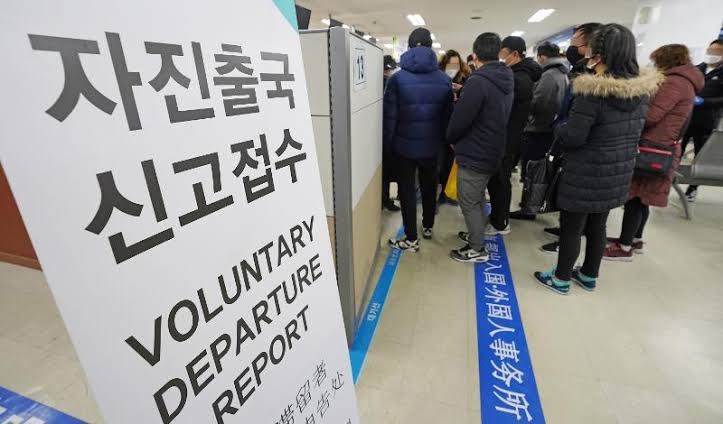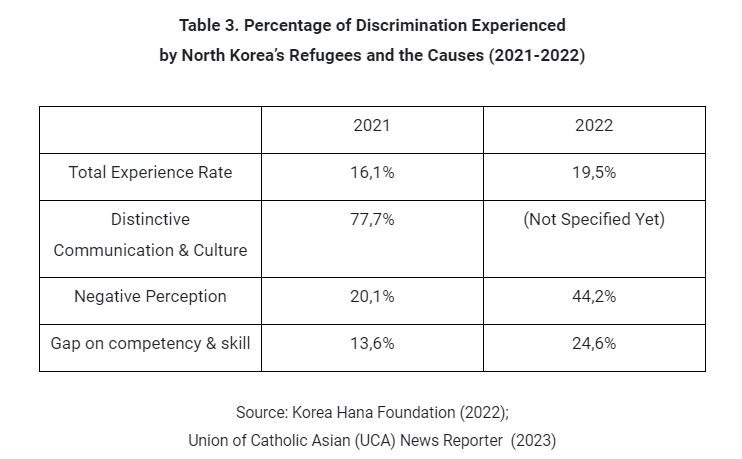Foreigners in Korea: To Serve or Disserve the National Interest?

Foreigners in Korea wait in line at the Korea Immigration Service. Photo by: Yonhap News
In the last five years, South Korea has faced many challenges, ranging from the Covid-19 pandemic, major corruption scandals, and widening inequality in society. However, it is undeniable that as a developed country, South Korea has a global appeal, particularly as a migration destination. K-Pop has popularized the Korean image globally, while a leading technological and advanced manufacturing base has pulled the Korean economy up the economic ladder.
On the other hand, the Land of Morning Calm is also bound to be hit by a combination of economic & demographic issues due to an aging population and labor shortages. The Bank of Korea predicted the trend to reversely affect the state’s macroeconomy since it would cost the fiscal posture, either decreasing income or increasing expenses. However, this grim prediction is by no means certain. It can be averted through policy means.
Foreigner-related issues appear to be discussed as an alternative to the labor deficit and to reinvigorate the demographic pyramid. Nevertheless, the foreigner issue in South Korea is not a one-sided discourse, but a reciprocal and often difficult circumstance between foreigners and locals. Then, how will the case of foreigners be handled in South Korea?
Current Demographic Condition and Forecast
The Korea Statistical Information Service (KOSIS) recorded that in 2022 there were 412.948 incoming migrants, representing an increase of roughly 87% from 2021. Other Asian neighbors dominated the 2022 arriving migrants, 95.063 of them were Chinese while Vietnamese, Thai, Uzbek and American followed respectively.
Towards 2022, ASEAN member states and Indian nationals in South Korea collectively showed an increasing number of immigrants as back then in 2017 Moon’s administration intensively promoted people mobility under the New Southern Policy. Between 2018-2022, ASEAN, Timor Leste, and India make up 29,6% of immigrants in South Korea. This will probably climb further up in the future since both Moon and Yoon Administrations managed to secure favorable ties with those countries with their foreign policies. Fortunately, ASEAN member states will grasp a demographic dividend in 2025 while 68% of its population is considered productive (Greene, 2013) and India’s 54% dividend will last until 2056 (Deshpande, 2023).
This kind of opportunity could become a tool for South Korea to manage the aforementioned macroeconomic strain by stimulating the productive immigrant under a fair foreign labor policy. It is not only on the desk of the Ministry of Foreign Affairs to establish a reliable impression of South Korea, but also the involvement of the ministry related to labor and interior affairs respectively to help determine a harmonious & fair foreign workers policy. Recently, there is more urgency to recruit more foreign workers for nursery and construction jobs, which complement domestic labor.
Besides, K-Pop is a huge basket to be explored as Rapkin (2021) explained that South Korea’s K-Pop is incredibly unwavering against the pandemic. For instance, a BTS paid live-streaming dubbed as the monumental achievement of the entertainment industry as well as Netflix documentaries of Blackpink which rated 7.3 out of 10 by IMDb. Diversifying the group members’ & idol’s nationality is also a worthy shot to level the playing field, thus the entertainment industry should work harder to assimilate nationalism and idolism under South Korean influence.
Challenges Amidst the Confidence
Prior to a vibrant discourse on immigration and its lookout, there is also a challenge that should be considered. An exclusive behavior from the locals inevitably affected the social landscape as the foreigner and the locals mingled as a common society. Seungwoo (2022) argued that the older generation that concentrated in certain locations, like rural areas, tends to be more exclusive because they have fewer interactions with foreigners while the younger with direct contact in urban areas tend to foster multicultural values. However, this youth was also vulnerable to a realistic conflict due to a limited number of job opportunities and resources. Thus, a challenge from both groups is visible.
Discrimination toward foreigners remains a persistent problem in South Korea. Pressley (2022) highlighted the viral anti-foreigner club in South Korea as well as the city’s over-priced cab service for foreigners. There was also a religion-based accident in Daegu where Muslim students from Korean universities tried to build a mosque in their neighborhood. They got permission to construct a mosque at first, but then they were turned down by the authorities due to a complaint from the locals concerning property rights violations and the prospect of slums in the region (Gong, 2023). Eventually, the court ruled to overturn the authorities’ decision. Yet, social friction remains under the surface, with blatant anti-muslim moves and demonstrations taking place.
Inter-Korean skepticism was also founded. The Korea Hana Foundation released two reports in 2021 and 2022 respectively about North Korean refugees in South Korea, with over 2,000 responders out of around 30.000 refugees per year. As the table presented below, there was an increasing number of refugees claiming to suffer from discrimination between 2021-2022, despite varying policies being introduced to embrace harmonious inter-Korean relations under the Ministry of Unification.

Crafting A Beneficial Multiculturalism
South Korea might kill two birds with one stone, to seize the opportunity and overcome the challenge, by nurturing multicultural values. Establishing a multicultural society doesn’t imply altering Korean culture or values since the locals recently have engaged more with the international community through marriage so the multicultural community in South Korea can be established organically. In the last five years, international marriages in South Korea have not yet surpassed 10% of total marriages, but it should also be observed because once the marriage has an offspring it could help determine Korea’s future demographic.
As the government develops the Ministry of Gender Equality & Family to assist the state’s multicultural families through various services like a hot-line number and language assistance, non-family-centered policies should also be embraced. For example, an excursion of foreign scholars and/or students into university should be promoted under an inter-institution scheme since it would be more affordable to invite more foreigners as well as empower the education institutions to take part in assessing foreigner’s issues directly.
Besides, honoring a local government that is able to expand its network across the globe under legitimate limited autonomy could be an appropriate tribute as it also lightens the central government’s duty. A kind of paradiplomacy, like sister-city or urban networks, is typical of decentralization which not only helps to preserve the national interest, but also deeply promotes the unseen scenes that only the local government or its people are aware of. Even Londoners dubbed their city as a multicultural city centuries ago (Wills, 2017) and the central government was dominated by the conservative wings. Therefore, a stimulus of political and structural will is needed no matter who they are.
Crafting a multicultural society that would benefit South Korea is indeed urgent for their own national interest. Amidst the moment to grapple with the incoming aging population, the central bank already noticed the burden to be taken. Thus, meticulously blending multicultural values into South Korean culture should be accelerated by establishing a fair and harmonious foreign workers policy, observing the international marriages’ effect on the demographic pyramid, and involving the local-level government & educational institutions in the issue. Furthermore, rather than treat the foreigner as an incendiary, shifting the discourse to optimally establish a beneficial regime to include foreigners to address the South Korean problem should be more prioritized.
Mohammad Izam Dwi Sukma is an undergraduate student majoring in International Relations study at Universitas Islam Indonesia. He can be found on Instagram with username @mohammad.izamds





